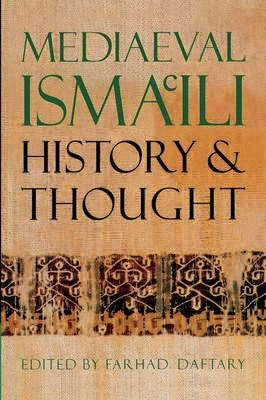Until recently the Ismaʿilis were judged almost exclusively on the basis of the hostile accounts of their Muslim enemies and the fanciful tales of the CrusadersA term applied to Christian invaders who carried out numerous campaigns to capture Jerusalem and Palestine from the Muslims in the 11th and 14th centuries CE.. As a result, numerous misconceptions were disseminated about the teachings and practices of the Ismaʿilis, known in European tradition as the Assassins. In the 1930s, however, authentic Ismaʿili texts began to be recovered from private collections which shed new light on mediaeval Ismaʿili history and thought. This collective volume brings together some of the original results of modern scholarship in the area, written by leading contemporary authorities, as well as distinguished Islamists.
Preface
Notes on transliteration and abbreviations
Notes on the contributors
1. Introduction: Ismaʿilis and Ismaʿili Studies
Farhad Daftary
Part I: The Classical Phase
-
The FatimidsMajor Muslim dynasty of Ismaili caliphs in North Africa (from 909) and later in Egypt (973–1171) More and the Qarmaṭīs of Baḥrayn
Wilferd Madelung -
The Cosmology of the pre-Fatimid Ismāʿīliyya
Heinz Halm -
Abu Yaʿqūb al-Sijistānī and the Seven Faculties of the Intellect
Wilferd Madelung -
The Ismaʿili Oath of Allegiance (ʿahdPromise, oath of allegiance. (See mithāq.)) and the ‘Sessions of Wisdom’ (majālisPl. of majlis; a term which literally means ‘a place to sit’ and refers to any formal gathering or assembly of peoples. al-ḥikma) in Fatimid Times
Heinz Halm -
Al-Qāḍī al-Nuʿmān and Ismaʿili Jurisprudence
Ismail K. Poonawala -
A Critique of Paul Casanova’s Dating of the Rasāʾil Ikhwān al-ṢafāʾFrom Arabic, lit. ‘Brethren of Purity’, a group of learned scholars who were based in Basra and Baghdad around the last quarter of the t10th century CE. It is more…
Abbas Hamdani -
Portraits of Self and Others: Ismaʿili Perspectives on the History of Religions
Azim A. Nanji -
An Ismaʿili Version of the Heresiography of the Seventy-two Erring Sects
Paul E. Walker
Part II: The Nizārī Phase
-
Ḥasan–i Ṣabbāḥ and the Origins of the Nizārī Ismaʿili Movement
Farhad Daftary -
The Power Struggle Between the Saljuqs and the Ismaʿilis of Alamūt, 487–518/1094–1124: The SaljuqMajor Muslim dynasty of Turkish origin in Persia and Iraq (1040–1194) and Syria (1078–1178). Perspective
Carole Hillenbrand -
The Ismaʿilis of Quhistān and the Maliks of Nimrūz of Sīstān
C. Edmund Bosworth -
The Philosopher/Vizier: Khwāja Naṣīr al-Ṭūsī and the Ismaʿilis
Hamid Dabashi -
‘Sometimes by the Sword, sometimes by the Dagger’: The Role of the Ismaʿilis in Mamluk–Mongol Relations in the 8th/14th Century
Charles Melville -
The Ismaʿili Gināns: Reflections on Authority and Authorship
Ali S. Asani -
The Nuqṭawī Movement of Maḥmūd Pisīkhānī and his Persian Cycle of Mystical-Materialism
Abbas Amanat
Bibliography
Index
‘… an extremely useful collection which deserves a place in the library of any individual or institute concerned with the study of Islam and of Islamic history.’
– Peter Jackson, Journal of Semitic Studies
‘Daftary is an indefatigable scholar and editor who has succeeded within a short period of time to revive and expand Isma‘ili studies as a legitimate variant of the wider Islamic tradition. This book is a living and eloquent testimony to his ongoing endeavours.’
–Youssef M. Choueri, History
‘… an indispensable volume for any Islamic history collection … absorbing and scholarly collection of essays …’
– George Lane, Bulletin of the School of Oriental and African Studies
‘A valuable resource for those interested in Isma‘ilism and its place within the larger context of Islamic history. Highly recommended to all academic and public libraries seriously interested in the fields of Islamic and Middle Eastern studies.”
– Choice
‘…valuable contribution to what is an increasingly flourishing subject of study …’
– Julie Scott Meisami, Journal of the American Oriental Society
‘…this is a useful book marking a significant advance in the area of Ismaʿili studies.’
– M. Momen, Iranian Studies
‘The efforts of Farhad Daftary have produced another important volume on the history of Ismaʿili Shiʿism.’
– Sumaiya Hamdani, International Journal of Middle East Studies
Farhad Daftary is head of the Department of Academic Research and Publications at The Institute of Ismaili Studies, London. An authority on Ismaʿili history, Dr. Daftary’s publications include The Ismāʿīlīs: Their History and Doctrines (1990), The Assassin Legends: Myths of the Ismaʿilis (1998) and Intellectual Traditions in Islam (2000).

